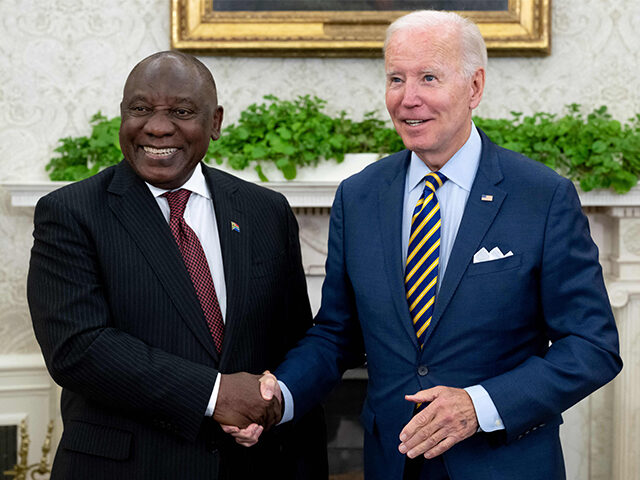JOHANNESBURG, South Africa — I am writing this column in complete darkness in the early hours of Friday morning, with only the glow of my computer, my smartphone, and a small emergency flashlight to help me.
This is “load shedding,” a process of electricity rationing by the state-owned power supply company, Eskom. As recently as two decades ago, South Africa had a surplus of electricity; now it has chronic nationwide shortages.
South African President Cyril Ramaphosa used his annual State of the Nation address Thursday to declare a “state of disaster” regarding the crisis. But this disaster, unlike others, was both foreseeable and man-made.
Decades ago, the government was warned that Eskom needed to expand its generation capacity to keep up with demand. Instead, the ruling party pushed out engineers and siphoned off money through corrupt contracts.
Critics who argued that overly aggressive affirmative action policies were denuding the company of technical capacity, or that “black economic empowerment” policies were being abused, were falsely derided as racists.
Now the country is stuck with a problem that could linger for decades. Even Cape Town, which is governed by the opposition, and has begun to develop independent energy sources, will have to wait years to see progress.
By subscribing, you agree to our terms of use & privacy policy. You will receive email marketing messages from Breitbart News Network to the email you provide. You may unsubscribe at any time.
Back in the United States, President Joe Biden delivered his own State of the Union address. He had better news to report, as unemployment has dipped to the lowest level in decades, and inflation has begun to ease.
But Biden had no solutions to offer for the ongoing disaster that has defined his presidency: the surge of millions of migrants across the southern U.S. border, most of whom have no legal claim to be in the U.S.
Like South Africa’s electricity crisis, the border crisis has been decades in the making, and is the result of decisions made in the interests of powerful economic and political elites, and against the national interest.
In the late 1980s, a bipartisan immigration reform granted amnesty to millions of illegal aliens but failed to follow through on promises for border security. As a result, more migrants continued to cross illegally.
The lesson that conservatives learned was that border security had to come first. That is why they opposed bipartisan, “comprehensive” immigration reform — whether under George W. Bush or Barack Obama.
Obama abandoned legislative efforts and tried to use — and abuse — his executive authority to grant reprieves from deportation to “Dreamers” (those brought illegally to the U.S. as minors) and to their parents.
Meanwhile, Democrat-run municipalities declared themselves “sanctuary cities,” vowing not to work with federal immigration law enforcement, creating new incentives for illegal migration and human trafficking.
Donald Trump was elected on a promise to enforce the border and build a “wall.” He made progress despite staunch opposition by Democrats and from Republicans who preferred a more lenient policy to keep wages low.
The current surge began when Biden was declared the winner of the 2020 election. Migrants and the cartels that smuggle them knew that Democrats intended to let millions of potential future voters into the country.
Just as South African critics of Eskom were called racists, so, too, American critics of Biden’s border policy are smeared as racists for pointing out Democrats’ obvious plan to use migration to change the U.S. electorate.
Now that border communities have been overrun, and migrants are starting to show up in cities increasingly burdened by crime, drugs, and economic malaise, Democrats are starting to pay a political price at the polls.
But all Biden offered in his address Tuesday night were meaningless claims about a “new border plan” and familiar attempts to shift blame to Congress for his own administration’s decision not to enforce the law.
And the U.S. may soon face an electricity crisis of its own. Biden claimed that the U.S. would need oil “for at least another decade,” an absurd that triggered laughter but which also revealed his agenda to kill fossil fuels. Today’s high energy prices are a warning of another slow-moving disaster in the making.
From Pretoria to Washington, two great and hopeful democracies are burdened by corrupt elites and weak political leadership.
Joel B. Pollak is Senior Editor-at-Large at Breitbart News and the host of Breitbart News Sunday on Sirius XM Patriot on Sunday evenings from 7 p.m. to 10 p.m. ET (4 p.m. to 7 p.m. PT). He is the author of the new biography, Rhoda: ‘Comrade Kadalie, You Are Out of Order’. He is also the author of the recent e-book, Neither Free nor Fair: The 2020 U.S. Presidential Election. He is a winner of the 2018 Robert Novak Journalism Alumni Fellowship. Follow him on Twitter at @joelpollak.

COMMENTS
Please let us know if you're having issues with commenting.